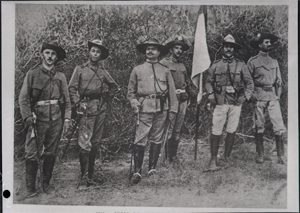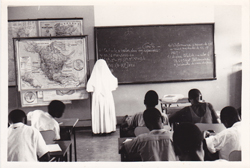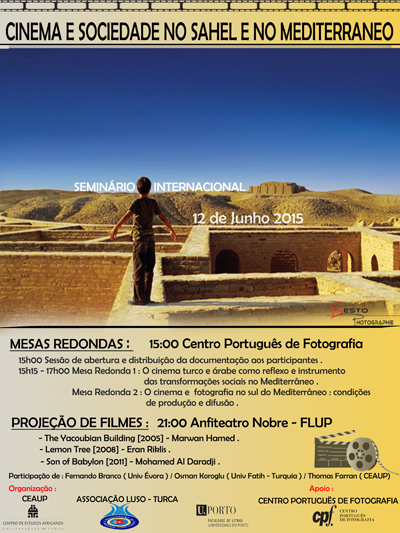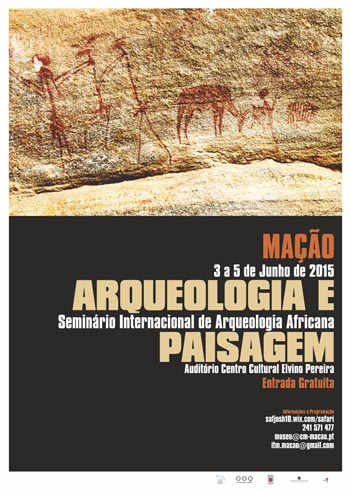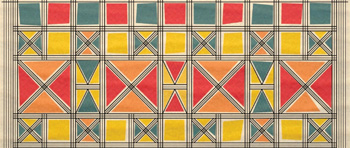|
Todas as grandes temáticas relacionadas com a origem e evolução da Humanidade, até ao presente, encontram em África um amplo e crucial território de pesquisa. A arqueologia, mercê da tardia ocorrência de documentação escrita no continente, mas também do silenciamento de muitas realidades endógenas durante a maior parte do período para que dispomos de fontes escritas, permanece como a principal fonte de recursos documentais para a compreensão das dinâmicas humanas no Continente. Temas fulcrais da história geral de África e da nossa espécie dependem essencialmente da investigação arqueológica, como as origens da espécie, as diversas migrações para fora de África no Pleistocénico, a arte rupestre, as modificações ambientais no Quaternário, as dinâmicas interculturais anteriores e posteriores ao contacto com os europeus, as origens da metalurgia, a diáspora moderna associado à escravatura, etc.
A investigação em arqueologia situa-se no cruzamento das ciências humanas com as ciências da terra e da vida, com a protecção dos vestígios materiais carregados de valores simbólicos que testemunham as diferentes culturas e com a socialização do conhecimento assim produzido, designadamente no domínio da museologia e da
comunicação científica e social.
Estudar a arqueologia africana na sociedade actual não é apenas prosseguir o esforço de muitos investigadores no período colonial, mas também beneficiar do cruzamento de perspectivas culturais e teóricas, constituindo equipas transdisciplinares e intercontinentais, em que os investigadores africanos assumiram de forma plena a condução da investigação. Os trabalhos do Congresso Pan-Africano de Arqueologia (PanAf), associados aos da União Internacional das Ciências Pré-Históricas e Proto-Históricas (UISPP), ao longo de décadas têm sistematizado essa nova era da investigação.
Esta dinâmica actual da investigação arqueológica africana é fundamental como instrumento para a refundação das ciências humanas (no âmbito dos esforços do Conselho Internacional de Filosofia e Ciências Humanas e da UNESCO) e para o entendimento das dinâmicas actuais de ligação
entre as realidades globais e locais (foco do proposto Ano Internacional do Entendimento Global).
A arqueologia africana continuará, certamente, um campo de pesquisa aberto durante os próximos anos. O crescente número de investigadores, bem como o crescente interesse que os estados Africanos, num ambiente de crescimento expectável mais favorável, estão a ter pelo seu património cultural e natural, justificam a criação de novas redes de pesquisa.
Em Janeiro de 2013, organizou-se, no Porto, um primeiro Seminário sobre Arqueologia de Angola (publicado na revista Africana Studia). Tendo este atingido os seus objetivos, nomeadamente pela comparação de experiências, assuntos e metodologias, existe agora a necessidade de um estudo mais alargado e comparativo.
Entre os dias 3 e 5 de Junho de 2015, o Instituto Terra e Memória (ITM), o Centro de Estudos Africanos da Universidade do Porto (CEAUP) e a Direcção Nacional dos Museus de Angola (DINAM), com a UISPP e o Centro de Geociências da Universidade de Coimbra, organizam um Seminário Internacional de Arqueologia Africana Sub-Sahariana. O encontro, para o qual se convidam todos os pesquisadores, visa como objectivos:
· divulgar os resultados de investigação arquelógica produzidos durante os últimos anos no continente Africano;
· consolidar projectos de investigação estruturantes nos domínios de Arqueologia e do Património;
· reforçar o intercâmbio entre equipas que trabalham em diferentes países africanos, em estreita colaboração com centros de investigação internacionais.
O tema do seminário é “África: arqueologia e paisagem”, focando em particular:
1. Arqueologia da paisagem e tecnologias do espaço na África Subsaariana: considerando os temas centrais da arqueologia da paisagem, destacando o papel da tecnologia espacial na gestão e interpretação das paisagens arqueológicas e abordando as perspectivas teóricas e metodológicas para o nosso entendimento do desenvolvimento das paisagens culturais e dos territórios.
2. Arqueologia e Cultura Material em África: examinando o desenvolvimento histórico dos estudos de cultura material desde a Early e Middle Stone Age, e introduzindo os debates actuais. Este tema visa traçar as mudanças de status da cultura material nos estudos arqueológicos até ao presente, incluindo aspectos como as materialidades, o papel dos museus, a estética, o património, o ambiente construído, etc.
3. Arqueologia e paisagem dos caçadores-recolectores da África meridional e da transição para as sociedades complexas anteriores ao contacto: a África meridional não apenas encerra alguns dos mais antigos fósseis de homens anatomicamente modernos, como revelou tradições de arte rupestre particularmente ricas. A pesquisa antropológica contribuiu quer para o desenvolvimento de modelos gerais de economia e organização social, quer para o seu questionamento actual. Este tema visa oferecer uma visão global sobre os mais recentes avanços da investigação, focando por um lado as questões teóricas e epistemológicas da relação entre antropologia e arqueologia, quer as questões metodológicas que devem orientar o futuro das investigações.
Para além deste tema central, serão aceites comunicações sobre:
4. Pré-História antiga (Early and Middle Stone Age) e Pré-História recente (Late Stone Age, Neolítico, Metalurgia inicial, sociedades complexas anteriores ao contacto);
5. Arqueologia do contacto com os Europeus em África e na diáspora africana (contextos arqueológicos das relações da África Subsaariana com o resto do mundo (África do Norte, migrações para a Eurásia, comunidades quilombolas na América do Sul, interação durante a época colonial);
6. Temáticas transversais: arte Rupestre, tecnologia, ecossistemas, arquitectura e sistemas de povoamento, organização do espaço e diferenciação social, urbanismo, sistemas hídricos e de irrigação, indústrias, transportes e comunicações, arqueologia do conflito, identidades e auto-representação, dinâmicas contemporâneas e usos do passado;
7. Patrimonialização de Arqueologia (Gestão do Património Arqueológico no quadro da Gestão global do território, Socialização do conhecimento, Valorização económica do Património Arqueológico através do Turismo Cultural.
|
All major issues related to the origin and evolution of Humanity, to the present, have in Africa a large and crucial area of research. Archaeology, thanks to the late occurrence of written documentation on the continent, but also to the silencing of many endogenous realities during most of the period for which we have written sources, remains the main basis of documentation for the understanding of human dynamics on the continent.
Key themes of the General History of Africa and of our species rely mainly upon the archaeological research, as the origins of the species, the various migrations out of Africa in the Pleistocene, the rock art, the environmental changes in the Quaternary, the intercultural dynamics prior to and after the contact with Europeans, the origins of metallurgy, the modern diaspora associated with slavery, etc.
The research in archeology is located at the intersection of the humanities with the earth and life sciences, with the protection of material remains embedded with symbolic values that testify the different cultures and the socialization of knowledge thus produced, particularly in the field of museology and scientific communication and media.
Studying African archeology in today's society is not only to continue the effort of many researchers in the colonial period, but also to benefit from the crossing of cultural and theoretical perspectives, constituting transdisciplinary and intercontinental teams, where African researchers have taken full responsibility on the research. The work of the Congress of Pan African Congress of Archaeology (PANAF), associated with the International Union of Prehistoric and Proto-Historic Sciences (UISPP), for decades have systematized this new era of research.
This present momentum of African archaeological research is essential as a tool for rebuilding the human sciences (as part of the efforts of the International Council of Philosophy and Human Sciences and UNESCO) and to understand the current dynamic connection between global and local realities (focus of the proposed International Year of Global Understanding).
African archeology will certainly remain as an open field of research in the coming years. The growing number of researchers, as well as the growing interest that African states, within a more favorable expected growth environment, are having by their cultural and natural heritage, justify the creation of new research networks.
In January 2013, in Oporto, was organized a first Seminar on Angola`s Archaeology (published in the Journal African Studia). Since this reached its goals, namely through the comparison of experiences, issues and methodologies, there is now the need for a wider comparative study.
Between the 3rd and the 5th June 2015, the Instituto Terra e Memória (ITM), the Centro de Estudos Africanos from the University of Porto (CEAUP) and the National Directorate of Angola Museums (DINAM), with the UISPP and the Centro de Geociências of the University of Coimbra, will organize an International Seminar on African Archaeology. The meeting, to which are invited all researchers, seeks the following objectives:
· Disseminate the archaeological research results produced in recent years in the African continent;
· Consolidate structuring research projects in the fields of Archaeology and Heritage;
· Strengthen exchanges between teams working in different African countries, in close collaboration with international research centers.
The theme of the conference is ‘Africa: Archaeology & Landscape’, namely focusing:
1. Landscape archaeology and the technologies of space in Sub-Saharan archaeology: considering the central themes of landscape archaeology, stressing the role of special technology for the management and interpretation of archaeological landscapes and approaching theoretical and methodological for our understanding of the development of cultural landscapes and territories.
2. Archaeology and Material Culture in Africa: examining the historical development of material culture studies since the Early and Middle Stone Age, and introducing current debates. This theme aims at tracing the changes of status in the archaeological studies to the present, including aspects as materialities, the role of museums, aesthetics, heritage, built enviroments, etc.
3. Archaeology and landscape of hunter-gatherers from Southern Africa and the transition to complex societies prior to the contact: Souther Africa 4rhas not only some of the oldest fossils of anatomically modern humans, but has revealed rock art traditions particularly rich. Anthropological research contributed towards the development of global economic and social models as well as for their current questioning. This theme aims at offering a global vision on the most recent advances of research, focusing on one hand the theoretical and epistemological implications in the relations between anthropology and archaeology and, on the other hand, the methodological criteria that should guide future research.
Besides the central theme we are keen to attract inputs from related disciplines such as:
4. Ancient Prehistory (Early and Middle Stone Age) and Recent Prehistory (Late Stone Age, Neolithic, Early Metallurgy, complex societies prior to the contact);
5. Archaeology of contact with Europeans within Africa and in the African Diaspora (archaeological contexts of relations of sub-Saharan Africa with the rest of the world, including North Africa, migrations to Eurasia, quilombolas communities in South America, interaction during colonial period,…);
6. Transversal themes: Rock Art, technology, ecosystems, architecture and settlement systems, organization of space and social differentiation, urban planning, water systems and irrigation, industry, transports and communication, conflict archeology, identity and self-representation, dynamics and contemporary uses of the past;
7. Archaeological Heritage as Patrimony(Management of Archaeological Heritage within the global territorial management, socialization of knowledge, economic valuation of the Archaeological Heritage through Cultural Tourism).
|
